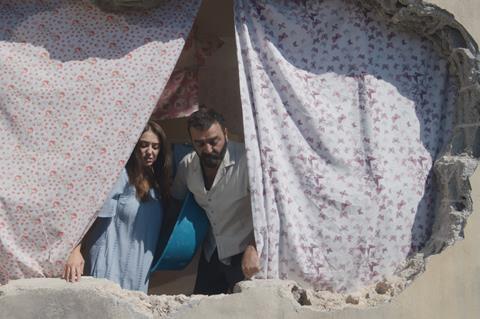Soudade Kaadan’s second feature is a delicate drama about a family in war-torn Syria

Dir: Soudade Kaadan. UK/Syrian Arab Republic/France/Qatar. 2022. 103 mins.
The last family living in a bombed-out Damascus neighbourhood has to decide between staying or leaving in Syrian director Soudade Kaadan’s striking but flawed second feature Nezouh, an intense and delicate film that bravely seeks to upend expectations of what the term “Syrian drama” generally suggests — violence and victims.
Often a powerful experience, largely on account of its multiple moments of visual artistry
In this it succeeds, but though Nezouh works wonderfully well as a symbolic evocation of a more hopeful Syria, it is less successful as drama, meaning that it’s lacking as a fictional record of the human experience. Kaadan’s The Day I Lost My Shadow took the Lion of the Future award for best debut at Venice in 2018, and Nezouh, a film with a vision, deserves to follow it out onto the festival circuit.
Fourteen-year-old Zeina (Hala Zein) and her parents, mother Hala (Kinda Aloush) and father Motaz (Samir al Masri), are among the final inhabitants of their war-torn area. The title is Arabic for “the displacement of soul, water and people”, but Motaz — a toxic combination of hammer-wielding brutishness, incompetence, and the pathetic — refuses to become another refugee: although staying behind is clearly dangerous, you can see his point. At the start, Hala passively submits to Motaz’s authority, but there is an imaginative, creative side to Zeina which suggests she thinks and feels differently.
In a scene which is a visual and aural triumph for its depiction of the aftermath, a bomb is dropped on the house, ripping a hole in the ceiling of Zeina’s room and bringing literal and metaphorical light into a house that has previously been in shadow. Zeina’s imagination transforms the clear blue sky into a lake on which she can skim stones. Suddenly Amer (Nizar Alani), a neighbouring lad who’s a tech head and budding filmmaker, is dropping a rope into her room and showing Zeina a movie he’s making — “a film about Syria where nobody dies”, as he describes it, like Nezouh itself. Almost impossibly saint-like, Amer will come to represent another kind of Syrian male, one that might offer some hope.
Amer’s film includes shots of the sea, which becomes Nezouh’s primary symbol of freedom — though of course the script knows that, for displaced people, the sea represents something else altogether. Kaadan indeed makes her points largely by symbol and metaphor, and the breaking of the house’s roof seems to lead to a breakdown of the patriarchy. Before long, while Motaz is away, Zeina and Hala are dancing together in a prelude to their leaving during the film’s drawn-out, and somewhat implausible, final stretch.
The Day I Lost My Shadow walked a somewhat unsteady line between straight and magical realism, and Nezouh is not free of the same issues. It is as though the director, enthralled by the often-beautiful fabric of symbol and metaphor she is so successfully weaving, loses interest in some of the basics, among them character work. Perhaps she is more responsible to her vision than to her people.
As the film’s emotional heart, Zeina — who has presumably looked on at the disappearance of her friends, at the destruction of her neighbourhood and of her childhood in general — seems to have remained entirely unaffected and appears relentlessly cheerful. She may be in denial, but the script never suggests that. (Zeina herself may be another symbol, of course — of the only attitude to life that will get people through these nightmares.) Meanwhile, although clearly motivated by Motaz’s proposal to marry Zeina to a soldier, Hala’s decision to leave seems too brusque and unsignalled. And Motaz’s continual macho insistence that he’s not crying — that it’s dust and allergies — is just too deja vu.
That said, Nezouh is often a powerful experience, largely on account of its multiple moments of visual artistry. In one very elegant scene transition, a pigeon — another symbol — is sent flying by the sound of Motaz’s hammer. The image of Motaz sitting slumped in his chair as rain pours onto him through the hole in the roof is the perfect tragic image of macho frailty — of someone who has seen his entire life-function, to protect his family, stolen from him by war. And wonderful details abound, as when Hala chides Zeina for dropping rubble out of her window of this bombed-out area, ironically in case it hurts someone.
Helene Louvart and Burak Kanbir’s sun-bleached images of the annihilated Damascus that Zeina and Hala walk through convey the full nightmarish horror of what the war has done to the city. Gentle, plucked string music accompanies some scenes, but at times feels a little saccharine.
Production companies: Berkeley Media Group, KAF Production, Ex Nihilo
International sales: mk2 films, quentin.bohanna@mk2.com
Producers: Yu-Fai Suen, Soudade Kaadan, Marc Bordure
Screenplay: Soudade Kaadan
Cinematography: Helene Louvart, Burak Kanbir
Production design: Osman Ozcan
Editing: Soudade Kaadan, Nelly Quettier
Music: Rob Lane, Rob Manning
Main cast: Hala Zein, Kinda Aloush, Nizar Alani, Samir al Mas






![The Brightest SunScreen[Courtesy HKIFF]](https://d1nslcd7m2225b.cloudfront.net/Pictures/274x183/3/5/0/1448350_thebrightestsunscreencourtesyhkiff_312678.jpg)















![The Brightest SunScreen[Courtesy HKIFF]](https://d1nslcd7m2225b.cloudfront.net/Pictures/100x67/3/5/0/1448350_thebrightestsunscreencourtesyhkiff_312678.jpg)

